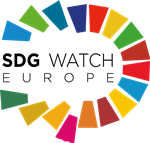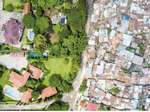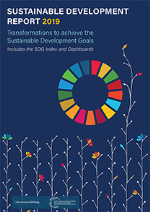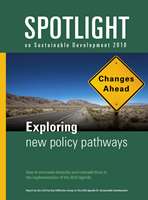Social Watch news
Published on Thu, 2019-07-11 12:47
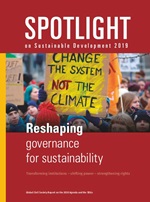 |
Four years after the adoption of the 2030 Agenda the world is off-track to achieve the Sustainable Development Goals (SDGs). Most governments have failed to turn the transformational vision of the 2030 Agenda into real transformational policies. Even worse, xenophobia and authoritarianism are on the rise in a growing number of countries. But there are signs of change. The implementation of the 2030 Agenda is not just a matter of better policies. It requires more holistic and more sweeping shifts in how and where power is vested, including through institutional, legal, social, economic and political commitments to realizing human rights and ecological justice. For this reason, the Spotlight Report 2019 has as main topic “reshaping governance for sustainability”. It offers analysis and recommendations on the global governance that sustainability requires, as well as on how to strengthen inclusive and participatory governance to overcome structural obstacles and institutional gaps. Since 2016, the annual Spotlight Report has been published and supported by a broad range of civil society organizations and trade unions. It provides one of the most comprehensive independent assessments of the implementation of the 2030 Agenda and the SDGs. At the roundtable event on July 11th in New York authors of the Spotlight Report 2019 will present key findings and recommendations to participants for discussion.
|
Published on Mon, 2019-07-08 00:00
Global civil society report assesses structural obstacles and institutional gaps in the implementation of the 2030 Agenda
New York, 8 July 2019: “the world is off-track to achieve the Sustainable Development Goals (SDGs). Most governments have failed to turn the transformational vision of the 2030 Agenda into real transformational policies. Even worse, xenophobia and authoritarianism are on the rise in a growing number of countries.”
“The implementation of the 2030 Agenda is not just a matter of better policies. It requires more holistic and more sweeping shifts in how power is vested, including through institutional and governance reforms.”
|
Published on Fri, 2019-07-05 00:25
The EU is still lacking a comprehensive strategy on the implementation of the 2030 Agenda and its ambitious commitments to action. On average, the EU has one of the world’s worst environmental footprint per capita, with our unsustainable lifestyles based on resource and labour exploitation in other parts of the world. The economy of the future needs to take into account the environmental and social impact beyond our borders rather than living in the illusion of a low-carbon, resource efficient Europe that exports resource-intensive production to other parts of the world. At the launching event on July 15th in New York authors of the Spotlight Report Sustainability in Europe will present in some important policy areas where there is an urgent need for action, because the external effects of European policies are not sufficiently taken into account.
|
Published on Wed, 2019-07-03 00:00
Reducing inequalities (SDG10) is essential for overcoming extreme poverty (SDG 1) and a successful implementation of the 2030 Agenda as a whole. Many countries experience high and increasing inequalities. A reversal of this trend is not in sight. Therefore, it is paramount to take political action towards reaching this central goal of the 2030 Agenda. Strong social protection and redistributive policies significantly reduce inequality within countries. Therefore, it is essential to develop overarching strategies, build universal social protection systems as well as assess and increase redistributive capacities. These measures have to ensure that no one is left behind and equitable access to protection against risks and against poverty for all people is guaranteed.
The panel will discuss the most persistent barriers to a sustained reduction of inequalities and the contribution of fiscal and social protection policies to overcome inequalities worldwide.
|
Published on Wed, 2019-07-03 00:00
Denmark, Sweden and Finland are the top ranking countries in terms of sustainable development, while Niger, Chad and the Central African Republic are the worse performers, according to the recently launched Sustainable Development Report 2019, by the Bertelsmann Foundation of Germany and the Sustainable Development Solutions Network, based in New York and Paris.*
The Bertelsmann-SDSN report includes 17 “dashboards” with indicators selected by the authors for each of the 17 Sustainable Development Goals, and a Global SDG Index that summarizes them in a single number and allows for the ranking of the 162 countries for which enough data are available.
|
Published on Mon, 2019-07-01 16:30
SDG 8: Promote sustained, inclusive and sustainable economic growth, full and productive employment and decent work for all
|
Published on Mon, 2019-07-01 00:00
 |
The upcoming 2019 High-Level Political Forum (HLPF) in July in New York with the theme, “Empowering people and ensuring inclusiveness and equality,” spurred Social Watch Philippines (SWP) and other organizations like the Global Call to Action against Poverty (GCAP), Save the Children, Philippine Alliance of Human Rights Advocates (PAHRA), Institute for Social Entrepreneurship in Asia (ISEA), Plan International, Philippine Social Enterprise Network (PhilSen), Tebtebba, Voice of the Free, and Fair Trade Alliance among others, to organize a broader CSO consultation workshop to catalyze a process for civil society organizations (CSO) from different sectors towards engaging the Philippine government on the Voluntary National Review (VNR). With the support from United Nations Development Programme (UNDP), Save the Children Philippines and Philippine Alliance of Human Rights Advocates (PAHRA), a consultation workshop Towards Coherent Policies for Sustainable Development Goals (SDGs) in the Philippines: Civil Society Organizations (CSO) Inputs to the Voluntary National Review (VNR) was held on February 7 to 8, 2019 in Quezon City, Philippines participated by around 70 representatives of different civil society organizations.
|
Published on Mon, 2019-06-24 15:55
The UN Secretary-General’s progress report on the SDGs shows that many will be left behind by 2030, but omits any mention to the responsibilities of the rich.
UN progress reports on almost any issue on which the secretariat is asked to inform Member States tend to follow the classic glass-half-full formula: We are moving, but much remains to be done.
Not surprisingly, this approach is repeated in the latest draft of the UN Secretary General’s report “Progress towards the Sustainable Development Goals” to be officially published in July as an input for the High Level Political Forum (HLPF) where the 2030 Agenda is going to be reviewed: “Progress has been made in a number of Goals and targets and a wealth of action has been undertaken;” however, progress has been slow on many Goals, (…) the most vulnerable people and countries continue to suffer the most, and the global response thus far has not been ambitious enough.” (excerpted from the Summary).
|
Published on Mon, 2019-06-24 15:36
The United Nations, in a new report to be released next month, has warned “there is no escaping the fact that the global landscape for the implementation of the 17 Sustainable Development Goals (SDGs) has generally deteriorated since 2015, hindering the efforts of governments and other partners”
And the commitment to multilateral cooperation, so central to implementing major global agreements, is now under pressure, says the 35-page report, due to be released ahead of the upcoming high-level political forum (HLPF) of the Economic and Social Council (ECOSOC), July 9-18.
|
Published on Mon, 2019-06-24 15:14
Trade and trade-related policies and international agreements are addressed explicitly in seven of the 17 Sustainable Development Goals (SDGs) and are identified as key to implementation of the 2030 Agenda and of the Addis Ababa Action Agenda (AAAA).
Market access is deemed essential to promote the graduation of the LDCs (targets 10.a, 17.11 and 17.12) and to improve the livelihood of small food producers (target 2.3). Trade distortions are to be dealt with, reducing subsidies on agriculture (target 2.b), on fossil fuels (12.c), and on fisheries (14.6).
|
SUSCRIBE TO OUR NEWSLETTER
Submit

|


